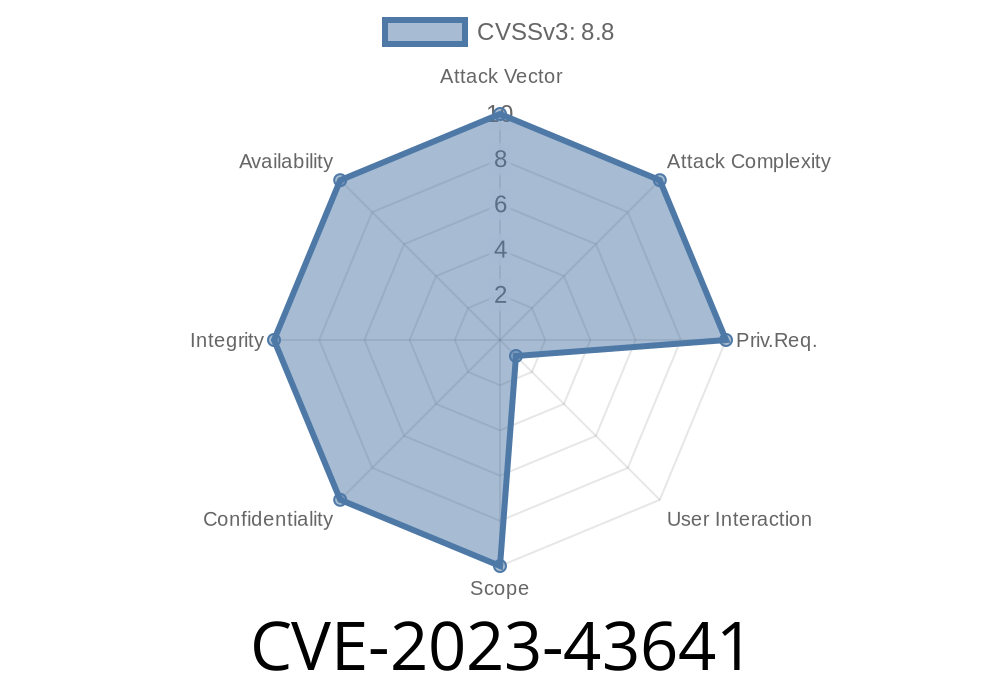A serious vulnerability, tracked as CVE-2023-43641, affects the libcue library—software widely used in GNOME desktops to handle .cue music metadata files. This weakness lets attackers run code on your system just by luring you into downloading a crafted .cue file. This is especially dangerous because GNOME automatically scans downloaded files using its indexer, so users might be exploited *without ever opening* the malicious file themselves.
In this deep dive, we’ll break down how the exploit works, see the root cause in libcue’s code, and provide practical advice on staying safe.
What Is libcue?
libcue is an open-source C library to parse and extract information from CUE sheets—a type of plaintext file that describes tracks and metadata for audio CDs. Applications like GNOME Music and tracker-miners (the search indexer) use it to automatically extract info from downloaded .cue files.
How Does the Vulnerability Work?
In versions up to 2.2.1, libcue does not properly validate the indexes of an array when parsing certain cues. An attacker can create a .cue file where some fields are chosen to trigger *out-of-bounds array access*. This can corrupt memory in a way that eventually allows the execution of attacker-controlled code.
On modern GNOME desktops, here's the exploit chain
1. Victim downloads a crafted .cue file (from browser/email or similar, usually to ~/Downloads).
tracker-miners (via tracker-extract) automatically scan new files.
3. tracker-miners detect .cue filename extension, and, by default, call libcue to parse it in the background.
4. Crafted .cue file triggers the libcue bug, causing memory corruption and potentially letting the attacker run code as your user.
*No explicit user interaction is needed, other than downloading!*
A Look at the Vulnerable Code
Let’s examine the buggy code in libcue. Here’s a simplified example based on analysis from the official bug report (GLSA 202310-06, Debian bug #1055794):
// parse.c (simplified)
typedef struct {
Track* tracks[100];
int num_tracks;
} Cd;
void add_track(Cd* cd, int track_num, Track* t) {
cd->tracks[track_num] = t; //!! No bounds check on track_num
cd->num_tracks++;
}
// Attacker crafts a CUE file like:
TRACK 99999 AUDIO
// This high track number causes buffer overflow!
Libcue expects track_num to be a number between 1 and about 100, but nothing checks this. When an attacker specifies a huge track number (e.g., TRACK 99999 AUDIO), it writes outside the bounds of the tracks[] array, corrupting adjacent memory—classically letting a hacker take control.
A minimal exploit .cue file might look like this
FILE "audiofile.flac" WAVE
TRACK 105 AUDIO
INDEX 01 00:00:00
// Real exploit would do more to place code in memory!
Note: The _real-world_ exploit would carefully layout the file to place *payload* code into memory, so that when tracker-miners parse this file, execution is hijacked.
Why Is This So Dangerous?
- Automatic Trigger: GNOME’s tracker-miners service *automatically* parses .cue files placed in ~/Downloads or any user folder it’s configured to index.
- No Dialog/Prompt: No "Open" or "Run" required. Simply downloading triggers the bug.
- Default Install: Both libcue and tracker-miners are pre-installed in popular distributions (Fedora, Ubuntu, Debian GNOME).
- Potential for Code Execution: While proven code exec is tricky, security researchers showed crafted .cue files *can* exploit the bug to run code as your user.
Patched in libcue 2.3..
- Most major distros have released updates. See libcue’s release history and Fedora Advisory.
What to do if you can't update
- Temporarily remove tracker-miners (sudo apt remove tracker-miners) or block it from scanning potentially unsafe folders.
- Delete unknown .cue files in your Downloads/data folders.
- Never download random .cue files—even those embedded by audio sharing sites—if you’re on GNOME with an old system.
Resources and References
- Official CVE-2023-43641 entry
- libcue v2.3. Patch Release
- tracker-miners GitHub
- Gentoo Security Review
- Debian Security Advisory
- Original Bugzilla report
If you use GNOME, you’re especially at risk.
- Don’t underestimate the risk: any program that triggers tracker-miners (file manager, browser, sync tool) can expose you.
Stay safe: update now, watch what you download, and keep an eye on background services!
*Have more questions? See the issue on GitHub or check your distro's security team page for specific mitigation info.*
Timeline
Published on: 10/09/2023 22:15:12 UTC
Last modified on: 10/27/2023 17:53:23 UTC
